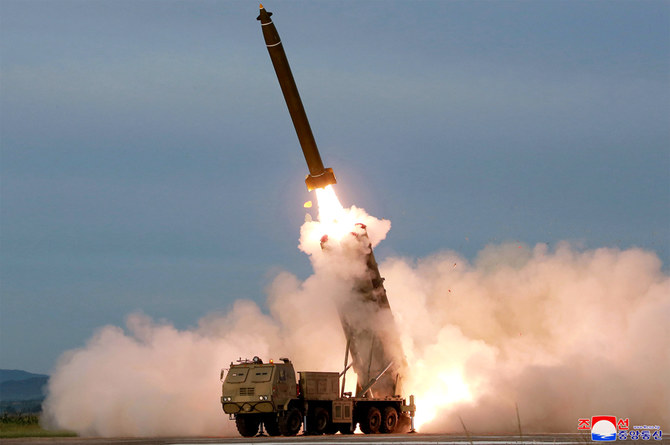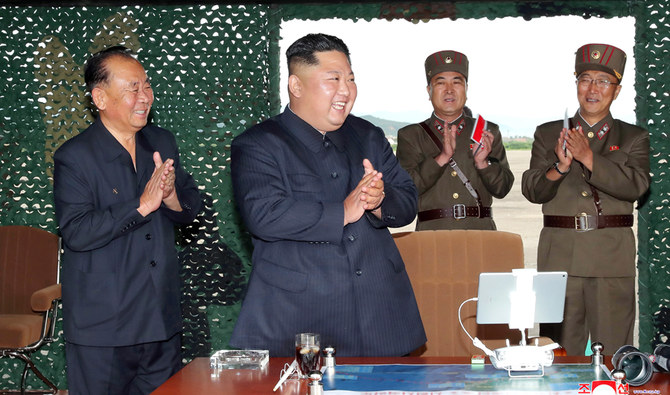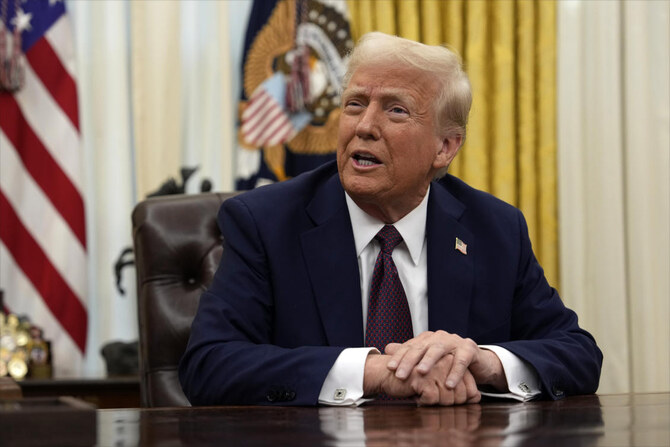SEOUL: North Korea test-fired a new type of multiple rocket launch system late Saturday into the sea off its east coast, state media reported.
It was the seventh test in a month, as negotiations to scrap the North’s nuclear arsenal flounder.
The North’s official Korean Central News Agency (KCNA) said on Sunday that the latest weapons’ test was on a newly developed “super-large multiple rocket launcher.”
The country’s leader Kim Jong-un oversaw the test and called the device a “great weapon.”
North Korea must step up its development of strategic and tactical weapons to counter the “ever-mounting military threats and pressure offensive of hostile forces,” KCNA reported Kim as saying while he oversaw the testing.
One of the short-range weapons has been identified as a KN-23, a mobile short-range ballistic missile based on the technology of Russia’s Iskander missile, which could hit targets across the South after evading missile interceptors operated by South Korea’s military. Pyongyang maintains that joint South Korea-US military drills are a provocation.
South Korea officials urged the North to stop hostile acts.
“We express strong concern that the North continues to test-fire short-range projectiles despite the South Korea-US military drills ending,” a presidential spokesman told reporters on Saturday. “We urge the North to halt such hostile acts that raise military tensions.”
Despite worries about the North’s provocations that could harm the security of South Korea where 28,500 US armed forces personnel are stationed, US President Donald Trump again touted his friendship with Kim.
“Kim Jong-un has been pretty straight with me, I think, and we’re going to see what’s going on, we’re going to see what’s happening,” he told reporters in Washington before heading to the G-7 summit in France on Friday night. “He likes testing missiles, but we never restricted short-range missiles.”
Trump and Kim held a surprise meeting in the Demilitarized Zone in June and agreed to resume working-level denuclearization negotiations within a month, but such a meeting has yet to be held.
In a further sign that nuclear disarmament talks are barely holding together, the North blamed US Secretary of State Mike Pompeo for complicating the talks, calling him a “diehard toxin.”
“He is truly impudent enough to utter such thoughtless words which only leave us disappointed and skeptical as to where we can solve any problem with such a guy,” North Korea’s Foreign Minister Ri Yong-ho said on Friday in a statement carried by KCNA, referring to Pompeo’s recent remarks in which he said sanctions would be kept until the North took concrete steps to bin nuclear weapons.
US Special Representative Stephen Biegun for North Korea was in Seoul last week to discuss ways to get negotiations back on track but it is not clear if he contacted his North Korean counterpart.
Biegun’s efforts were overshadowed by South Korea’s surprising decision to sever military ties with Japan.
On Thursday, the presidential Blue House announced it would pull out of an intelligence-sharing agreement with Japan, a key pillar of the US-led trilateral alliance in East Asia to check the influence of China and Russia.
The intelligence pact, called the General Security of Military Information Agreement (GSOMIA), has benefited South Korea’s military to collect key information on North Korean nuclear and missile activities, as Japan operates seven spy satellites while South Korea has no such strategic assets.
The decision to end GSOMIA came amid escalating trade disputes over Japan’s restriction of exporting chip-making materials to South Korea following disputes arising from Japanese colonial rule.
























